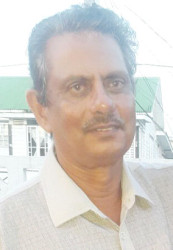The Public Service should be depoliticised, according to retired Permanent Secretary (PS) Hydar Ally, who yesterday expressed regret at not taking a back seat in the political realm while on the job.
“Maybe I should have kept a lower political profile but that is easier said than done… I don’t want to at this point try to make excuses. I think it is a violation of the principle of the impartiality of the public service and maybe I stand guilty as charged,” Ally said during testimony to the ongoing Commis-sion of Inquiry (CoI) into the public service.
Ally was a long-serving permanent secretary under the former PPP/C government and also at the same time a senior member of the PPP. His public service career spanned about 20 years, during which time he had functioned as the Permanent Secretary in three ministries.
He was one of three persons who testified yesterday before CoI Chairman Professor Harold Lutchman and Commis-sioners Samuel Goolsarran and Sandra Jones.

Lutchman, while making it clear that he was not passing judgement, asked Ally about the political position he held while he was a PS. Ally said he supports the principle of neutrality in the public service. “I think that this is an ideal, that we should always strive for but we are not living in an ideal society,” he said, before adding that the politicising of the public service started years ago and has become a part of the Guyanese culture.
“This is not something new. It has become, in a sense, engraved in our political culture and governments take advantage of it and I think that it is further complicated by the fact that we live in a Third World environment…,” he said, while adding that he does not see his membership in the PPP as necessarily something that interfered with his professionalism or the way he managed a ministry.
“I think that I have always attempted to be professional and to execute my duties in a very objective manner, impartial and without any recourse to party kind of politics,” he stressed.
Ally also said that there may be advantages in being a political PS. “You are held to a high level of accountability, not only to the statutory state bodies but also to your own party and membership, because you are put under pressure to deliver,” he suggested.
He said that it is all about one’s ability to deliver and get things done. “I think that we should not be too harsh on permanent secretaries who may have been affiliated to one party or the other. You are seeing it happening onto today,” he said.
According to Ally, with the new administration, similar appointments are being seen. “You see it is coming from people who were on the campaign trail, they were on the list of candidates,” he said.
He expressed hope that someday it will reach a point where there can be a public service free from the influence of politics and which is politically neutral. “It is an ideal. I hope that someday we will get there,” he said.
Ally expressed the belief that in a case where a PS whose party loses the general elections while they are on the party platform “the decent thing” for the PS to do is to resign or if their contract has come to an end not to have it renewed “as I have done”. He informed that as soon as the elections results were announced in May, given that his party had been defeated, he immediately wrote a letter to Minister of State Joseph Harmon indicating that he no longer had an interest in remaining at his post.
“Personally, I believe that permanent secretaries who are political, who are on the campaign trail, [on the] list of candidates, I think they should do the decent thing and just resign as I have done,” he said while noting that he could have continued but he decided to do the “decent thing”.
Asked by Commission-er Jones why he allowed himself to break the fundamental rules of the public service, he said that his political life predated his appointment as PS. He said that he has been a member of the PPP for more than 30 years.
Meanwhile, Ally said that many public servants are in their “prime” when they reach the retirement age. “Asking them to retire at that age [55], a relatively young age, I would say, is in my view a loss to the country and the economy in terms of experience and productivity,” he said.
“I still feel young. I feel as if I can still make a contribution,” he noted.
With regards to wages and salary, he called for a collective bargaining agreement between the Guyana Public Service Union and the Public Service Ministry to be honoured. He proposed that an inter-agency wages committee comprising of government and union representatives be established to determine the quantum of wages and salaries for public servants, increases and other allowances and benefits. Following Ally, Dave Hicks, an employee of the National Drainage and Irrigation Authority also addressed the commission on behalf of himself and more than eighty colleagues all of whom are contract workers. Among his complaints is that their numerous concerns are not being addressed.
The public hearings will continue on Monday morning at the Department of Public Service Building, at Waterloo Street, Georgetown.




